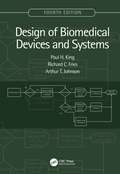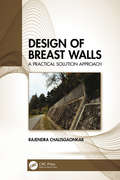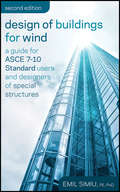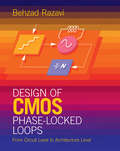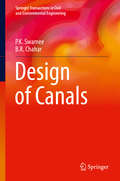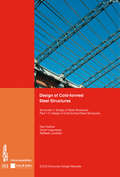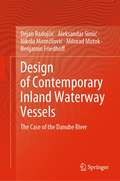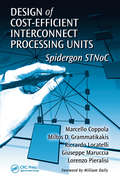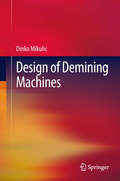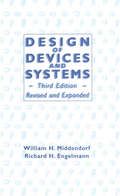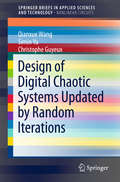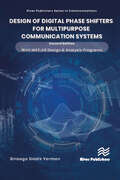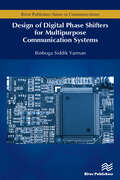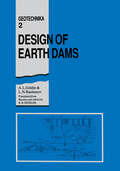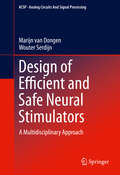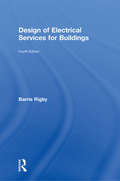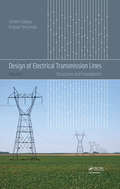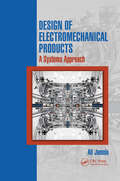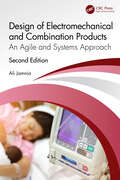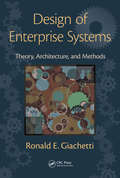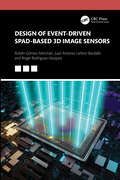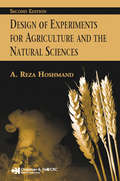- Table View
- List View
Design of Biomedical Devices and Systems, 4th edition
by Paul H. King Richard C. Fries Arthur T. JohnsonThis will be a substantial revision of a highly regarded text, intended for senior design capstone courses within departments of biomedical engineering, bioengineering, biological engineering and medical engineering, worldwide. Each chapter will be thoroughly updated and revised to reflect the latest developments. New material will be added on entrepreneurship, bioengineering statistics, clinical trials and CRISPR. New examples, applications and problems will be added in each chapter.There will be strong efforts made to increase the number of clinical applications to enhance the overall relevance of the material that's presented. Significant new material added on FDA regulations.
Design of Breast Walls: A Practical Solution Approach
by Rajendra ChalisgaonkarThe design of breast walls is important parameter for various earth-retaining purposes, and many problems are encountered in the field as a result of improper design and the proper explanation of parameters which influence the technoeconomic designs is required. The book provides insight into the design of retaining walls by explaining the basics of earth pressure theories, the parameters influencing earth pressures, gravity vis-à-vis breast walls and tables and charts for designing stone masonry and concrete breast walls across eight chapters. Details of the analysis are tabulated to aid professional engineers or designers in their practical work. FEATURES Basic principles, design methodology, the influence of various parameters on design and construction features Technoeconomical designs for various combinations of pertinent parameters How to design masonry and concrete walls Design principles and methodologies of designing breast walls with illustrative examples and construction features Design charts and tables for ease of access and a quick design process of breast walls This volume is aimed at professionals in civil engineering, geotechnical engineering, retaining walls, soil mechanics and foundation engineering, as well as engineers working in the highway, water resources and construction sectors.
Design of Buildings for Wind
by Emil SimiuASCE 7 is the US standard for identifying minimum design loads for buildings and other structures. ASCE 7 covers many load types, of which wind is one. The purpose of this book is to provide structural and architectural engineers with the practical state-of-the-art knowledge and tools needed for designing and retrofitting buildings for wind loads. The book will also cover wind-induced loss estimation. This new edition include a guide to the thoroughly revised, 2010 version of the ASCE 7 Standard provisions for wind loads; incorporate major advances achieved in recent years in the design of tall buildings for wind; present material on retrofitting and loss estimation; and improve the presentation of the material to increase its usefulness to structural engineers.Key features:New focus on tall buildings helps make the analysis and design guidance easier and less complex.Covers the new simplified design methods of ASCE 7-10, guiding designers to clearly understand the spirit and letter of the provisions and use the design methods with confidence and ease.Includes new coverage of retrofitting for wind load resistance and loss estimation from hurricane winds.Thoroughly revised and updated to conform with current practice and research.
Design of CMOS Millimeter-Wave and Terahertz Integrated Circuits with Metamaterials
by Hao Yu Yang ShangThis book shows that with the use of metamaterials, one can have coherent THz signal generation, amplification, transmission, and detection for phase-arrayed CMOS transistors with significantly improved performance. Offering detailed coverage from device to system, the book describes the design and application of metamaterials in actual CMOS integrated circuits, includes real circuit examples and chip demonstrations with measurement results, and also evaluates system performance after CMOS-based system-on-chip integration. The book reflects the latest research progress and provides a state-of-the-art reference on CMOS-based metamaterial devices and mm-wave and THz systems.
Design of CMOS Phase-Locked Loops: From Circuit Level to Architecture Level
by Behzad RazaviUsing a modern, pedagogical approach, this textbook gives students and engineers a comprehensive and rigorous knowledge of CMOS phase-locked loop (PLL) design for a wide range of applications. It features intuitive presentation of theoretical concepts, built up gradually from their simplest form to more practical systems; broad coverage of key topics, including oscillators, phase noise, analog PLLs, digital PLLs, RF synthesizers, delay-locked loops, clock and data recovery circuits, and frequency dividers; tutorial chapters on high-performance oscillator design, covering fundamentals to advanced topologies; and extensive use of circuit simulations to teach design mentality, highlight design flaws, and connect theory with practice. Including over 200 thought-provoking examples highlighting best practices and common pitfalls, 250 end-of-chapter homework problems to test and enhance the readers' understanding, and solutions and lecture slides for instructors, this is the perfect text for senior undergraduate and graduate-level students and professional engineers who want an in-depth understanding of PLL design.
Design of Canals
by P. K. Swamee B. R. ChaharThe book presents firsthand material from the authors on design of hydraulic canals. The book discusses elements of design based on principles of hydraulic flow through canals. It covers optimization of design based on usage requirements and economic constraints. The book includes explicit design equations and design procedures along with design examples for varied cases. With its comprehensive coverage of the principles of hydraulic canal design, this book will prove useful to students, researchers and practicing engineers. End-of-chapter pedagogical elements make it ideal for use in graduate courses on hydraulic structures offered by most civil engineering departments across the world.
Design of Cold-formed Steel Structures: Eurocode 3: Design of Steel Structures. Part 1-3 Design of cold-formed Steel Structures
by Dan Dubina Viorel Ungureanu Raffaele LandolfoThe book is concerned with design of cold-formed steel structures in building based on the Eurocode 3 package, particularly on EN 1993-1-3. It contains the essentials of theoretical background and design rules for cold-formed steel sections and sheeting, members and connections for building applications. Elaborated examples and design applications - more than 200 pages - are included in the respective chapters in order to provide a better understanding to the reader.
Design of Contemporary Inland Waterway Vessels: The Case of the Danube River
by Dejan Radojčić Aleksandar Simić Nikola Momčilović Milorad Motok Benjamin FriedhoffInland Waterway (IW), or river vessels are in every respect different from the seagoing ships. The professional literature is mostly focused on conventional seagoing fleets, leaving a gap in the documentation of design practices for IW vessels. The principal attribute that differentiates river vessels from the seagoing ships is the low, or shallow, draught due to water depth restrictions.This book addresses key aspects for the design of contemporary, shallow draught IW vessels for the transport of dry cargo (containers and bulk cargo). Most of the logic that is presented is applicable to the design of river vessels for any river, but the material that is presented is focused on vessels for the River Danube and its tributaries. The term ‘contemporary river vessel’ assumes that the present-day technology and current Danube river infrastructure are taken into consideration in its design. It is believed that the technologies and concepts that are proposed here are applicable for all new vessel designs for the next 10 to 15 years. Other innovative technologies should be considered for designs beyond that horizon. Moreover, nowadays contemporary IW vessel must be in harmony with the Environmentally Sustainable Transport (EST) policies and hence special attention is paid to both ecology and efficiency. Note however that shipowners and ship operators usually tend to choose the conventional cost-effective transport technologies. Given that potential divergence of interests, the concepts and technologies treated here may be regarded as innovative.
Design of Cost-Efficient Interconnect Processing Units: Spidergon STNoC (System-on-Chip Design and Technologies)
by Marcello Coppola Miltos D. Grammatikakis Riccardo Locatelli Giuseppe Maruccia Lorenzo PieralisiStreamlined Design Solutions Specifically for NoCTo solve critical network-on-chip (NoC) architecture and design problems related to structure, performance and modularity, engineers generally rely on guidance from the abundance of literature about better-understood system-level interconnection networks. However, on-chip networks present several distinct challenges that require novel and specialized solutions not found in the tried-and-true system-level techniques. A Balanced Analysis of NoC ArchitectureAs the first detailed description of the commercial Spidergon STNoC architecture, Design of Cost-Efficient Interconnect Processing Units: Spidergon STNoC examines the highly regarded, cost-cutting technology that is set to replace well-known shared bus architectures, such as STBus, for demanding multiprocessor system-on-chip (SoC) applications. Employing a balanced, well-organized structure, simple teaching methods, numerous illustrations, and easy-to-understand examples, the authors explain: how the SoC and NoC technology works why developers designed it the way they did the system-level design methodology and tools used to configure the Spidergon STNoC architecture differences in cost structure between NoCs and system-level networks From professionals in computer sciences, electrical engineering, and other related fields, to semiconductor vendors and investors – all readers will appreciate the encyclopedic treatment of background NoC information ranging from CMPs to the basics of interconnection networks. The text introduces innovative system-level design methodology and tools for efficient design space exploration and topology selection. It also provides a wealth of key theoretical and practical MPSoC and NoC topics, such as technological deep sub-micron effects, homogeneous and heterogeneous processor architectures, multicore SoC, interconnect processing units, generic NoC components, and embeddings of common communication patterns. An Arsenal of Practical Learning Tools at Your DisposalThe book features a complimentary CD-ROM for practical training on NoC modeling and design-space exploration. It incorporates the award-winning System C-based On-Chip Communication Network (OCCN) environment, the only open-source network modeling and simulation framework currently available. With its consistent, comprehensive overview of the state of the art – and future trends – of NoC design, this indispensible text can help readers harness the value within the vast and ever-changing world of network-on-chip technology.
Design of Crystal Structures Using Hydrogen Bonds on Molecular-Layered Cocrystals and Proton–Electron Mixed Conductor (Springer Theses)
by Masaki DonoshitaThis thesis addresses the design of crystal structures using hydrogen bonds. In particular, it focuses on the design of functionalities and the control over the packing of molecular assemblies, based on molecular designs.Firstly, the synthesis and evaluation of a proton–electron mixed conducting charge transfer salt is reported. Focusing on the difference in the strength of hydrogen bonds and weaker intermolecular interactions, a system was rationally designed and constructed where electron-conducting molecular wires were encapsulated within a proton-conducting matrix. Next, the investigation of structural phase transitions in a cocrystal consisting of hydrogen-bonded two-dimensional molecular assemblies is reported. Drastic rearrangements of hydrogen-bonded molecular assemblies in the cocrystal led to single-crystal-to-single-crystal phase transitions, resulting in anisotropic changes in the crystal shape. Furthermore, chemical modification of a component molecule in the cocrystal is reported. The modification afforded control over the stacking patterns of the two-dimensional molecular assemblies, i.e., sheets, and the mechanism was discussed considering the intersheet intermolecular interactions and molecular motion.It is suggested that hydrogen bonds are beneficial to construct molecular assemblies in molecular crystals because of their strength and well-defined directionality, and the consideration of coexisting weaker intermolecular interactions can lead to the design of whole crystal structures and, hence, functionalities. This thesis benefits students and researchers working on solid-state chemistry by presenting various methods for characterizing and evaluating the properties of molecular solids.
Design of Demining Machines
by Dinko MikulicIn constant effort to eliminate mine danger, international mine action community has been developing safety, efficiency and cost-effectiveness of clearance methods. Demining machines have become necessary when conducting humanitarian demining where the mechanization of demining provides greater safety and productivity. Design of Demining Machines describes the development and testing of modern demining machines in humanitarian demining. Relevant data for design of demining machines are included to explain the machinery implemented and some innovative and inspiring development solutions. Development technologies, companies and projects are discussed to provide a comprehensive estimate of the effects of various design factors and to proper selection of optimal parameters for designing the demining machines. Covering the dynamic processes occurring in machine assemblies and their components to a broader understanding of demining machine as a whole, Design of Demining Machines is primarily tailored as a text for the study of the fundamentals and engineering techniques involved in the calculation and design of demining machines. It will prove as useful resource for engineers, designers, researchers and policy makers working in this field.
Design of Devices and Systems
by William H. Middendorf"Details the product and system design process from conceptual, economic, and ethical considerations to modeling, decision making, and testing. Enables engineering educators to satisfy the requirements of the Accreditation Board for Engineering and Technology (ABET) for the design component of engineering curricula. Third Edition features expanded coverage of product liability, engineering standards, patents, system design, computer-aided design, optimum design, reliability, and more. "
Design of Digital Chaotic Systems Updated by Random Iterations (SpringerBriefs in Applied Sciences and Technology)
by Qianxue Wang Simin Yu Christophe GuyeuxThis brief studies the general problem of constructing digital chaotic systems in devices with finite precision from low-dimensional to high-dimensional settings, and establishes a general framework for composing them. The contributors demonstrate that the associated state networks of digital chaotic systems are strongly connected. They then further prove that digital chaotic systems satisfy Devaney’s definition of chaos on the domain of finite precision. The book presents Lyapunov exponents, as well as implementations to show the potential application of digital chaotic systems in the real world; the authors also discuss the basic advantages and practical benefits of this approach. The authors explore the solutions to dynamic degradation (including short cycle length, decayed distribution and low linear complexity) by proposing novel modelling methods and hardware designs for two different one-dimensional chaotic systems, which satisfy Devaney’s definition of chaos. They then extend it to a higher-dimensional digital-domain chaotic system, which has been used in image-encryption technology. This ensures readers do not encounter large differences between actual and theoretical chaotic orbits through small errors. Digital Chaotic Systems serves as an up-to-date reference on an important research topic for researchers and students in control science and engineering, computing, mathematics and other related fields of study.
Design of Digital Phase Shifters for Multipurpose Communication Systems
by Binboga Siddik YarmanThis book aims to cover a new emerging need in designing digital phase shifter for modern communication systems. With the advancement of new generation mobile communication systems, directed beams of antenna arrays save a substantial amount of power as well as improve the communication quality. In this regard, beam-forming circuits, such as digital phase shifters (DPS) constitute essential parts of the antenna array systems. Therefore, this book is devoted to the design of digital phase shifters for various communications systems. Nowadays, phase array systems demand compact phase shifters suitable for chip implementation with wide phase-range and broad frequency band. Each chapter of this book is organized as stand-alone in such a way that the reader requires no specific background acquired from the other chapters. For each phase shifter topology introduced in this book, the reader is furnished with explicit design equations to construct the circuit under consideration. Furthermore, design equations are programmed using MATLAB to assess the electrical performance of the phase shifters with ideal and lossy components. MATLAB design programs are given at the and of each chapter as appendices and provided as soft copy on the web page of the book. In chapters 12 and 14, MMIC layouts for the lattice and T-section based DPS are provided for the readers. It is hoped that an interested reader can immediately identifies the “optimum phase shifter topology” for the need under consideration with its estimated electric performance.
Design of Digital Phase Shifters for Multipurpose Communication Systems (River Publishers Series In Communications Ser.)
by Binboga Siddik YarmanDesign of Digital Phase Shifters for Multipurpose Communication Systems aims to cover a new emerging need in designing digital phase shifters for modern communication systems. With the advancement of new generation mobile communication systems, directed beams save a substantial amount of RF-power, and improve the noise immunity. In this regard, beam-forming circuits, namely, digital phase shifters constitute essential parts the antenna arrays. Therefore, this book is devoted to design of digital phase shifters for various communications systems.In the good old days, phase shifter design requirements used to demand narrow bandwidth with no physical size constraints. Nowadays, they must be compact and suitable for Very Large Scale Integrated Circuits (VLSI) or Microwave Monolithic Integrated Circuit (MMIC) implementation with Wide Phase Range (WPR) and Wide Frequency Band (WFB).Since the 1980s, the author has been designing digital phase shifters for various applications. He started to work with loaded lines phase shifters, and then employed branch line couplers to achieve wider frequency bands. In order to reduce the physical size, he used a 3 element Symmetric LC ladder based T or PI configurations. In order to achieve broad frequency band with large phase range, usage of LC lattice structures is inevitable. Lately, the author designed phase shifters using both lowpass and highpass LC ladder and lattice based switched-structures, which are suitable for monolithic implementation. In the course of design, MOS transistors were employed as switching elements. This book includes several novel digital phase shifter topologies, which provides wide phase range and wideband operation.Technical topics discussed in the book include:- Basic Concept of Antenna Arrays- Concept of Digital Phase Bit- Scattering Parameters to analyze the electric performance of phase shifters- Transmission Lines as circuit elements to construct practical phase shifters- Loaded Line Digital Phase Shifters (DPS)- Lowpass Based T/PI Section DPS- Highpass Based T/PI Section DPS- 3-Element LC T/PI Section DPS- Wide Phase Range, Wide Frequency Band Symmetric Lattice Based DPSFor each topology presented, explicit design equations are provided and programs to assess the electric performance of each topology is developed in a MatLab environment. It is expected that the reader will be self-sufficient to design and implement the digital phase shifters topologies presented in this book.
Design of Earth Dams
by A.L. GoldinEarth dams are the most common impoundment structures, with stringent requirements imposed on their design and construction. Modern design require accurate static and dynamic computations based on thorough analysis of stress-strain conditions, as detailed in this handbook (translated from the Russia
Design of Efficient and Safe Neural Stimulators
by Marijn Van Dongen Wouter SerdijnThis book discusses the design of neural stimulator systems which are used for the treatment of a wide variety of brain disorders such as Parkinson's, depression and tinnitus. Whereas many existing books treating neural stimulation focus on one particular design aspect, such as the electrical design of the stimulator, this book uses a multidisciplinary approach: by combining the fields of neuroscience, electrophysiology and electrical engineering a thorough understanding of the complete neural stimulation chain is created (from the stimulation IC down to the neural cell). This multidisciplinary approach enables readers to gain new insights into stimulator design, while context is provided by presenting innovative design examples.
Design of Electrical Services for Buildings
by Barrie RigbyElectrical services are a vital component in any building, so it is necessary for construction professionals to understand the basic principle of services design. Design of Electrical Services for Buildings provides a basic grounding for students and graduates in the field. It covers methods of wiring, schemes of distribution and protection for lighting and power installations. Systems such as alarms and standby supplies are also covered. Each method is described in detail and examples of calculations are given. For this fourth edition, the coverage of wiring and electrical regulations have been brought fully up to date, and the practical information has been revised.
Design of Electrical Transmission Lines: Structures and Foundations
by Sriram Kalaga Prasad YenumulaThis book covers structural and foundation systems used in high-voltage transmission lines, conductors, insulators, hardware and component assembly. In most developing countries, the term “transmission structures” usually means lattice steel towers. The term actually includes a vast range of structural systems and configurations of various materials such as wood, steel, concrete and composites. This book discusses those systems along with associated topics such as structure functions and configurations, load cases for design, analysis techniques, structure and foundation modeling, design deliverables and latest advances in the field. In the foundations section, theories related to direct embedment, drilled shaf ts, spread foundations and anchors are discussed in detail. Featuring worked out design problems for students, the book is aimed at students, practicing engineers, researchers and academics. It contains beneficial information for those involved in the design and maintenance of transmission line structures and foundations. For those in academia, it will be an adequate text-book / design guide for graduate-level courses on the topic. Engineers and managers at utilities and electrical corporations will find the book a useful reference at work.
Design of Electromechanical Products: A Systems Approach
by Ali JamniaDesign, development and life-cycle management of any electromechanical product is a complex task that requires a cross-functional team spanning multiple organizations, including design, manufacturing, and service. Ineffective design techniques, combined with poor communication between various teams, often leads to delays in product launches, with last minute design compromises and changes. The purpose of Design of Electromechanical Products: A Systems Approach is to provide a practical set of guidelines and best practices for driving world-class design, development, and sustainability of electromechanical products. The information provided within this text is applicable across the entire span of product life-cycle management, from initial concept work to the detailed design, analysis, and development stages, and through to product support and end-of-life. It is intended for professional engineers, designers, and technical managers, and provides a gateway to developing a product’s design history file ("DHF") and device aster record ("DMR"). These tools enable design engineers to communicate a product’s design, manufacturability, and service procedures with various cross-functional teams.
Design of Electromechanical and Combination Products: An Agile and Systems Approach
by Ali JamniaThe second edition of this work, now with the expanded title of Design of Electromechanical and Combination Products, covers the design and development of electromechanical products, updated throughout to focus not only on an Agile Systems approach but also its application to disposables and consumables. Providing a practical set of guidelines and thorough examination of best practices, this book focuses on cutting-edge research on sustainability of electromechanical and combination products. Key Features Presents the design, development, and life cycle management of electromechanical and combination products Provides a practical set of guidelines and best practices for world-class design Explains the role of costing and pricing in product design Covers Design for X and its role in product life-cycle management Examines the dynamics of cross-functional design and product development teams Develops DHF and DMR as tools and inherent components of configuration management Includes numerous real-world examples of electromechanical and combination product designs This book is intended for scientists, engineers, designers, and technical managers, and provides a gateway to developing a product’s design history file (DHF) and device master record (DMR). These tools enable the design team to communicate a product’s design, manufacturability, and service procedures with various cross-functional teams.
Design of Electronic Devices Using Redox-Active Organic Molecules and Their Porous Coordination Networks (Springer Theses)
by Jaejun KimThis book addresses the development of electronic devices using redox-active organic molecules and their porous coordination networks (PCNs), and highlights the importance of the molecular arrangement. Redox-active organic molecules hold considerable promise as flexible electronic elements, because their electronic state can easily be controlled using external energy. Although various kinds of redox-active organic molecules have been synthesized, attempts to apply them to electronic devices have been limited, owing to the lack of proper structural design. Moreover, ligand-based redox-active PCNs remain largely unexplored because of the limited availability of redox-active ligands. In addition to developing new redox-active organic molecules, in order to design electronic devices based on these molecules/PCNs, it is essential to understand the connections between their molecular arrangement, electrical properties, and redox activity. In this thesis, the redox-active organic molecule 2,5,8-tri(4-pyridyl)1,3-diazaphenalene (TPDAP), which features a large pi plane and multi-intermolecular interactivity, is used to develop a resistive switching memory device. In addition, its PCNs are synthesized to fabricate chemiresistive sensors, and the electrical properties are modulated using post-synthetic modification. Each mechanism is systematically investigated by means of structural determination and well-defined control experiments. Subsequently, the book proposes general guidelines for designing electronic devices using redox-active organic molecules. The book will appeal to a broad range of readers, from basic scientists to materials engineers, as well as general, non-expert readers.
Design of Enterprise Systems: Theory, Architecture, and Methods
by Ronald GiachettiIn practice, many different people with backgrounds in many different disciplines contribute to the design of an enterprise. Anyone who makes decisions to change the current enterprise to achieve some preferred structure is considered a designer. What is problematic is how to use the knowledge of separate aspects of the enterprise to achieve a globally optimized enterprise. The synthesis of knowledge from many disciplines to design an enterprise defines the field of enterprise engineering.Because enterprise systems are exceedingly complex, encompassing many independent domains of study, students must first be taught how to think about enterprise systems. Specifically written for advanced and intermediate courses and modules, Design of Enterprise Systems: Theory, Architecture, and Methods takes a system-theoretical perspective of the enterprise. It describes a systematic approach, called the enterprise design method, to design the enterprise. The design method demonstrates the principles, models, methods, and tools needed to design enterprise systems. The author uses the enterprise system design methodology to organize the chapters to mimic the completion of an actual project. Thus, the book details the enterprise engineering process from initial conceptualization of an enterprise to its final design.Pedagogical tools available include:For instructors: PowerPoint® slides for each chapter Project case studies that can be assigned as long-term projects to accompany the text Quiz questions for each chapter Business Process Analyzer software available for download For students: Templates, checklists, forms, and models to support enterprise engineering activities The book fills a need for greater design content in engineering curricula by describing how to design enterprise systems. Inclusion of design is also critical for business students, since they must realize the import their decisions may have on the long-term design of the enterprises they work with. The book’s practical focus and project-based approach coupled with the pedagogical tools gives students the knowledge and skills they need to lead enterprise engineering projects.
Design of Event-Driven SPAD-Based 3D Image Sensors
by Rubén Gómez-Merchán Juan Antonio Leñero-Bardallo Ángel Rodríguez-VázquezThe book presents a top-down circuit description for the implementation of asynchronous vision sensors based on Single-Photon Avalanche Diodes (SPADs). It provides design considerations to convey the SPADs pulses through a channel shared by all the pixels. The book also presents architectures where dynamic vision sensors and SPADs converge.Design of Event-Driven SPAD-Based 3D Image Sensors provides detailed technical insights about novel image sensor architectures with SPADs with asynchronous operation. At the sensor level, the book provides asynchronous circuitry to read and arbiter the pixel outputs. The authors explore new LiDAR architectures with asynchronous operation and provide insights into their design. A detailed benchmark of modern and competitive LiDAR systems is also presented. At the pixel level, the book provides design considerations to convey the SPADs pulses through a channel shared by all the pixels. At the sensor level, the book provides asynchronous circuitry to read and arbiter the pixel outputs. Finally, experimental results of very novel LiDAR systems with asynchronous operation will be provided and analyzed.The book is written for professionals who want to explore new tendencies on the design of image sensors for the implementation of LiDAR systems.
Design of Experiments for Agriculture and the Natural Sciences
by Reza HoshmandWritten to meet the needs of both students and applied researchers, Design of Experiments for Agriculture and the Natural Sciences, Second Edition serves as an introductory guide to experimental design and analysis. Like the popular original, this thorough text provides an understanding of the logical underpinnings of design and analysis by selecting and discussing only those carefully chosen designs that offer the greatest utility. However, it improves on the first edition by adhering to a step-by-step process that greatly improves accessibility and understanding. Real problems from different areas of agriculture and science are presented throughout to show how practical issues of design and analysis are best handled. Completely revised to greatly enhance readability, this new edition includes: A new chapter on covariance analysis to help readers reduce errors, while enhancing their ability to examine covariances among selected variables Expanded material on multiple regression and variance analysis Additional examples, problems, and case studies A step-by-step Minitab® guide to help with data analysis Intended for those in the agriculture, environmental, and natural science fields as well as statisticians, this text requires no previous exposure to analysis of variance, although some familiarity with basic statistical fundamentals is assumed. In keeping with the book's practical orientation, numerous workable problems are presented throughout to reinforce the reader's ability to creatively apply the principles and concepts in any given situation.
